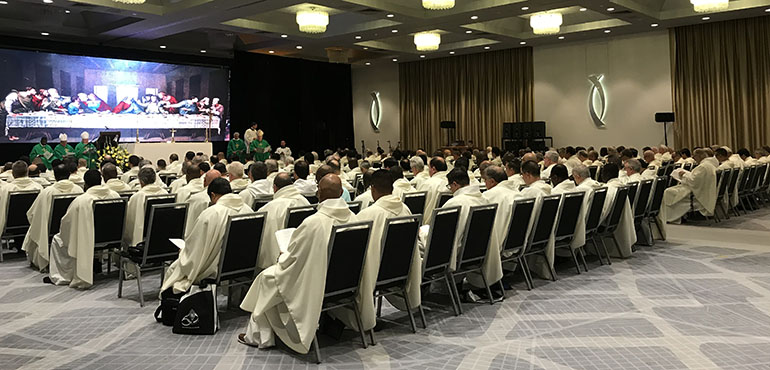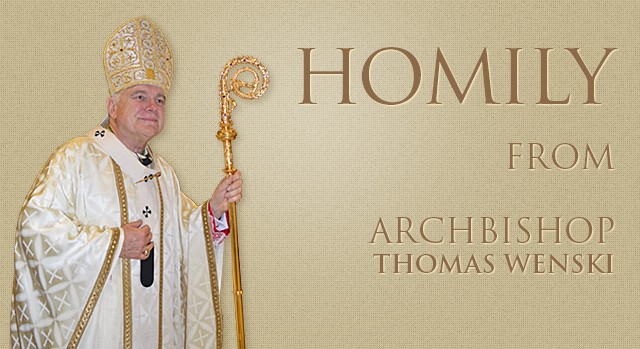By Archbishop Thomas Wenski - The Archdiocese of Miami

Photographer: COURTESY | Sr. Elizabeth Worley
Archdiocesan priests join Archbishop Thomas Wenski and his auxiliary bishops for morning Mass and prayer Sept. 19, the second day of the annual clergy convocation being held at the Hilton Miami Downtown. The event, scheduled to conclude Sept. 20, included guest speakers, workshops and opportunities for spiritual and fraternal renewal among local clergy.
Archbishop Thomas Wenski preached this homily Sept. 19, 2018, during morning Mass and prayer with archdiocesan priests gathered for their annual convocation, Sept. 18-20, 2018, at the Hilton Miami Downtown.
Today, people are increasingly addicted to “outrage” — in fact, the internet and cable news support a whole industry devoted to “outrage” — which could be defined as talk designed to provoke emotional responses — anger, fear, moral indignation among others. It is sustained by overgeneralization, sensationalism, inaccurate information and “ad hominem” attacks.
Oppositional research designed to uncover dirt about an opponent is seen as a legitimate tactic in the “contact sport” that is today’s politics. Debate and argument is replaced with shrill polemics, polemics that generate little light but much heat that feeds the outrage.
It is said that we live in an era of change; but perhaps it is more accurate to say that we are living through a change of an era. And one of the signs of our times is that all the institutions of society have been shaken. Positions of service are turned into instruments of personal gain. We see this in politics, we see this in academia, in the press, in the entertainment world, in business – and certainly we have seen this in the Church.
Because of corruption and greed, because of the abuse of authority and power, all these institutions have been undermined to one extent or another. So it’s not surprising that this instability has spawned this “outrage industry” — and you’d think that there’s a contest for who will win the “most outraged” award.
As I said last night, 2002 — and reforms the bishops made with the Charter on the protection of the young and vulnerable — came too late for too many victims. Victims and their families are angry — and justly so. But what the Church has done since 2002 is obscured by those bloggers who use “outrage” as click bait or those talking heads on cable TV who exploit it as a strategy to increase audiences and therefore their advertising revenue.
In today’s Gospel, Jesus criticizes the cynicism and the self-contradictory attitudes of those who reject both him and John the Baptist. Using what must have been a common ditty sung by children in the streets, Jesus tells them they don’t know what they want. Jesus knows he’s not going to win the hearts of those who have decided not to believe in him.
In today’s first reading, we heard St. Paul’s ode to love. It’s a beautiful passage, one that we all are very familiar with, if only because it’s chosen so often for weddings.
The hyper-partisan divisiveness that characterizes most of our political discourse — a divisiveness that threatens to wash over into our ecclesial discourse — is perhaps the way of the world; but, as St. Paul told those contentious Corinthians, it cannot be the way of the Church, for the way of the Church must be a “more excellent way,” the way of love (cf. 1 Cor 12:31-13:13).
I read those blogs about this current crisis — I like to tell myself that I have to — and that it’s not just because of prurient interest. But whether the post is from the right or the left of our current ecclesial divides, what strikes me is how much the authors seem to be driven by an unholy zeal, a “bitter zeal” that rather than witnessing to the Truth undermines it. Bitter zeal attacks rather than corrects; bitter zeal humiliates, it doesn’t heal.
The cause of so many ruptures in the Body of Christ that resulted in schisms over the course of history can be traced to such “bitter zeal” among those who fancied themselves as “reformers.” You don’t win souls for Christ unless you love them as Christ does. No reform or revitalization of Church life has been the fruit of a bitter zeal.
As Jesus says in today’s Gospel: “But wisdom is vindicated by all her children.” The exegetes puzzle over the meaning of this phrase; but I think it simply means, “By their fruits, you shall know them.” The “children of wisdom” are those enumerated by St. Paul in his ode to love: Love is patient, love is kind; it rejoices in truth, it hopes all things, love endures all things.
St. John Paul II told priests that the people look to them for the “word lived” before the “word proclaimed.” The days are long gone when what “Father said” or “What teacher said” was law. People today will not follow “blind guides” as Jesus described the Pharisees; but they will follow pastors whose authenticity is revealed in their transparency. When all is said and done, it is witness that convinces, not words.
And remember, Jesus even in his “hard sayings” is not in the “outrage industry.” He has come not to stoke our fears or incite our anger but to bring us to the fullness of life. May we always be in mind that, after the Gospel is read, we kiss the Book and pray quietly: “Through the words of the Gospel may our sins be wiped away.”


Comments from readers